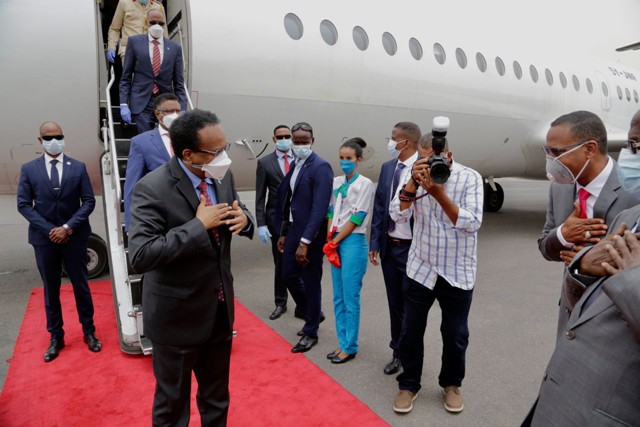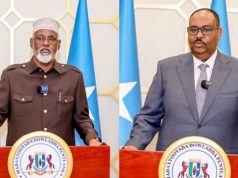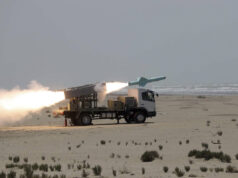Somalia has entered a period of fruitful changes, second thoughts, tolerance and recognition
that were unthinkable just a few days ago.
One of the important changes concerns the President of the Federal Republic of Somalia,
Mohamed Abdullahi Mohamed, nicknamed Farmajo (Cheese), who is to face soon the
trepidation of the electoral vote. To celebrate the lifting of the coronavirus lockdown and the
resumption of normal institutional activities, last week Farmajo went to Parliament but he was
vehemently challenged there by two young parliamentarians from Jubbaland, to the point of
forcing him to stop his speech, that was resumed only after the intervention of the Speaker of
Parliament.
The malaise of the two parliamentarians goes back to the problems associated with the
re-election of Ahmed Mohamed Islam, called Madobe (Black). The former two-time Governor of
Somalia’s southernmost federated state, Jubbaland, ran for a third time – despite the
impediment of the Statute – thanks to the influence of neighboring Kenya, which sees him as a
bulwark against Al Shabab who often crossed over the border with commando actions that
caused numerous victims among the Kenyan soldiers and also among the tourists in the most
famous resorts of the country, such as Lamu, endangering one of Kenya’s largest source of
income.
The Government of Somalia initially thwarted Madobe’s re-election by sending 700 soldiers to
the Gedo region that is part of Jubaland, with the intention of cancelling the re-election of the
Governor and restoring compliance with the local Statute, but the operation was held back by
the International Community which saw it, as a smoke screen in the eyes, a risk of a return to
the civil war.
The situation seemed to have stalled when President Farmajo, about to embark for an official
visit to Djibouti this morning, issued a note with which, on the one hand, he recalled the reasons
for the illegitimacy of Madobe’s third term re-election, on the other hand threw him an olive
branch by calling him interim President of Jubaland for two years, pressing him with the burden
of calling new elections for the Governorate. Although it is true that Madobe immediately
protested the limited recognition, it is equally true that he agreed to participate in the meeting
which, in view of Somalia’s imminent general elections, Farmajo himself, again today, convened
to be held with all the Governors of the Federal Member States.

Somali Federal Parliament Mursal, the Somali President Mohamed A. Mohamed Farmajo, the
President of Djibouti Omar Gelle, the Ethiopian Prime Minister Abyi Ahmed Ali, the President of
Somaliland Muse Bihi Abdi, Somali Premier Hassan Ali Khayre, Speaker of House of Elders of
Somaliland, Suleiman Mohamud Aden.
Farmajo’s hope would be to bring to the meeting an exponent from Somaliland, the Northern
State that is demanding independence.
To resolve this dispute, Farmajo flew to Djibouti today to attend a meeting organized with
Somaliland’s President, Muse Bihi Abdi, under the mediation of Ethiopian Prime Minister Abiy
Ahmed Ali. It is evident to the International Community that Somaliland’s claim to independence,
in a World of increasingly concentrated geopolitical blocs, is completely unrealistic and that the
sooner Somaliland will agree to federate with Somalia, the sooner a problem of individualism
that, in many ways is incomprehensible, will be eradicated.
However, it is to be seen if Farmajo’s balancing act can fit into the normal political dialectic
between the central and local governments and between the majority and the opposition – which
constitute the salt of any democracy – the re-thinking which has been witnessed during this
period is also shown in Al Shabab’ s the doctrine.
The anticovid-19 hospital inaugurated by the Al Shabab in Gelib, northeast of Kismayo
The terrorist group released images of the anti-Covid-19 hospital that was setup in Jilib, a city
located in the interior of Southern Somalia’s Central Juba region, Northeast of Kismayo. The
row of beds in separate rooms, each of which is equipped with breathing machinery, open up to
reflection in many ways. Undoubtedly, there is a conspicuous economic and logistical
availability, but above all the international relations that have allowed the acquisition of
cutting-edge sanitary materials, their installation, their operation and the relative maintenance
emerge.
This is a fundamental turning point in terms of Islamist doctrine because we no longer rely on
divine intervention, as understood by the obscurantist vision typical of religious fanaticism, but
trust in the scientific progress achieved by men with their ability, their alacrity and their curiosity.
If the Al Shabab become aware of everything in the meanings and all the implications that the
investment in the Jilib hospital entails, a step will be taken towards overcoming the
anachronistic position that opposes them to the evolution of humanity







